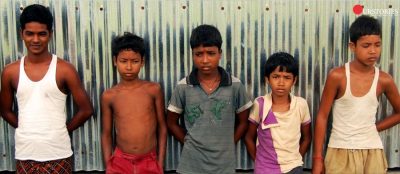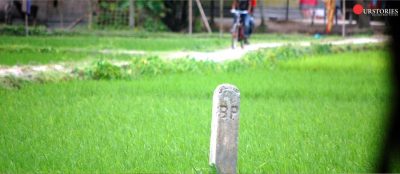By
Sudeep Mukhia
School boys inside the (erstwhile) Mashaldanga enclave. They had to have “Indian” fathers to be able to go to schools, which were in Indian territories
Anu Ara Bibi has four children, three daughters and a son. The eldest goes to college, the others to school. The only reason they are getting an education is that Anu Ara’s children have four different fathers.
She is telling me this outside her home in Mashaldanga, a ninety minute drive through green-soaked paddy fields from West Bengal’s Cooch Behar, just a couple of kilometers short of the Bangladesh border.
Till the stroke of midnight on July 31, Mashaldanga was a Bangladeshi enclave, a small bit of Bangladesh surrounded completely by India, one of 61 such. Across the border, in a mirror image were 111 enclaves or chhiths in Bangla, which were Indian territories within Bangladesh.
On July 31, a 40 year old deal between the two countries was operationalised and thousands stranded in these enclaves became Indians (or Bangladeshis). A day’s euphoria was splashed across the papers and live TV coverage.
The cement beam was all that marked the boundary between India and Bangladesh
At Ground Zero though, for those whom it mattered the most, things were far more subdued even though for them, Independence Day came two weeks early. It couldn’t have come a day sooner, deprived of schools, hospitals, police — every facility that administration provides, because neither state can technically enter the other’s territory. For these people, the struggle was to prove their very existence, because they really were no-where people, neither Indians nor Bangladeshis, without an identity or a nationality.
Inside the enclaves, what people went through was beyond these abstractions. It wasn’t a matter of material survival: I saw no apparent poverty, homelessness, beggars or destitutes. The struggle for these people was a very basic one, that tore apart and laid bare in public even the most personal; like who the father of Anu Ara’s children?
He is standing right next to her, Muzamil, slight and shorter than her, in an oversized shirt and pants. So why did she say her children had four different fathers? Both of them look away in silence before a neighbour pitches in. “Inside the chhiths we have no schools or colleges and we can’t leave the chhitths because we have no papers, so…” By now, Aru Ara has taken over the conversation. “So we have to name an Indian man as the father so that our children get some kind of identification papers and attend schools outside.” Who are these men? They could be relatives or just random friends of friends who were paid for pretend paternity.
“Of course I feel bad. I am their father only here, at home, inside this chhitth. Once they are outside, I cease to exist as their father,” Muzamil responds to my very obvious question. Anu Ara just looks at me without saying anything. That makes my “did you feel bad” question sound even more stupid.
In the crowd that had gathered, a quick voice vote showed most school-going children had been given the same solution. Fake fathers in exchange for an education and then perhaps a job. Uncles who are fathers on paper to young lads. A sister’s father-in-law is anointed with the paternity of a six-year-old; most likely the two have never met.
Between the ether of diplomatic give and take, the rough edges of domestic politics and some quirks of historical fate, the most personal relations and human linkages had to be faked to beat the system and get ahead.
So does that mean an entire generation has been confined to the chhitths? I ask this while packing up my notebooks and camera to leave. “Oh no, no, of course not,” says the uncle-fathers of one of the school students. “This Muzamil, he works in Gurgaon.” That’s 1,800 kilometers away, I say. It turns out that Muzamil and Anu Ara both work in the same gated Gurgaon community where my parents stay. He is a gardener and she, a domestic help.
“But how,” I ask, “You have no papers to travel.”
For the first time that entire afternoon, they both break into a smile. “Now we will,” is all she says as Muzamil gives me his “Indian” mobile number in case my family needs some help back in Gurgaon.
This article was reproduced with the kind permission of Our Stories and was originally published here




No Comments Yet!
You can be first to comment this post!